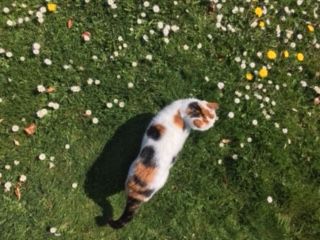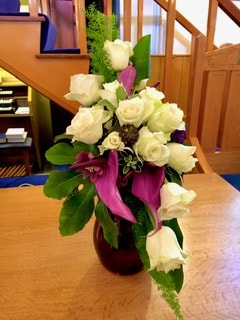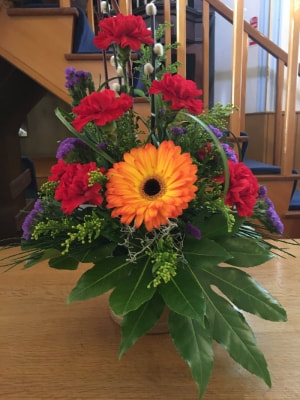
Over the past few months, Wendy and I have got into the habit most days to taking time to name a few things each day that we have been grateful for. It has been a good experience, in the midst of the turmoil of ordinary life, to deliberately focus on what has been good.
Our daily gratitude practice has partly been motivated by the studies Wendy has been doing with her hypnotherapy course. Her course has been an opportunity to study how our brains operate and how we can so easily get caught up in cycles of anxiety and other unhealthy mental patterns.
At the centre of the problem with negative thinking is often what is termed the primitive brain, that part of the human brain that we share in common with reptiles and other primitive species. The primary function of the primitive brain is to protect us from danger. And while often it does an important job, when it begins to dominate our experience, it can leave us feeling overly anxious and a mental world filled with negativity and danger.
Studies have shown that the very simple practice of spending just two minutes a day re-focussing on the positive aspects of one’s life through naming basic things that one is grateful for each day, has the remarkable ability to change the weather patterns of our mental world, helping us to see rays of sunshine where before we had only seen dark clouds.
Just two minutes a day of gratitude can make a world of difference (by making a difference in our mental world). It doesn't mean that we have to pretend that difficulty and danger are not present. This is not trying to blot out our negative experiences with positive thinking, it is simply choosing in the midst of all that is going on, to remind oneself of small moments that one has been grateful for during the course of a day.
Gratitude has always been an important element in our journey of faith. Many of the Psalms are expressions of gratitude:
Psalm 106:7 Oh Give thanks to the Lord, for He is good. His Steadfast love endures forever.
Psalm 86:12 I will give thanks to you, O Lord my God, with my whole heart, and I will glorify your name forever.
Psalm 100:4 Enter His gates with thanksgiving, and His courts with praise. Give thanks to Him; bless His name!
The Apostle Paul in many of his letters to the earliest Christian communities, calls on those communities to practice gratitude.
In 1 Thessalonians 5:16-18 Paul writes: “Rejoice always, pray continually, give thanks in all circumstances; for this is God’s will for you in Christ Jesus.”
In this verse, giving thanks in all circumstances is a means for living one’s life prayerfully and with joy. Gratitude creates a prayerful atmosphere to our lives and opens us to joy. And Paul encourages us to do this in all circumstances.
That has probably been one of the insights that I have gained in Wendy’s and my recent practice of 2 minutes of daily gratitude, that even when a day has been difficult, there have always been things to be grateful for, and in naming those gratitudes I have often begun to see the difficulties on a new light also.
In Philippians 4:6-7 Paul writes: Do not be anxious about anything, but in every situation, by prayer and petition, with thanksgiving, present your requests to God. And the peace of God, which transcends all understanding, will guard you hearts and your minds in Christ Jesus.
These verses begin with the concept of anxiety “do not be anxious”, and ends with the concept of peace “the peace of God, which transcends all understanding, will guard your hearts and your minds in Christ Jesus”. And right in the middle we have the word thanks giving. It is as though Paul is suggesting to us that if we want to move from a mind of anxiety, our primitive mind, to a mind of peace, our spiritual mind, thanksgiving and gratitude are the key.
In these past few weeks, our media and our thoughts have become dominated by stories of the corona-virus. Hearing individual stories of real people who have died in China, Italy, Spain, the UK and more recently in the USA are stark reminders of the reality of the threat posed by the corona-virus. It is understandable that for many of us, anxiety levels have risen, because, if not ourselves, almost all of us have friends and family who have underlying health conditions that would make them especially vulnerable to the corona-virus. On Sunday before Wendy fetched me from the airport she did a final shop before we quarantine ourselves. She said the mood in the shop could only be described as sombre. For many of us, our primitive brains, which are doing an important job of wanting to protect us and our loved one’s, are working over-time, understandably dominating the weather-patterns of our minds.
And while we need to be listening with care to the messages of danger, and acting to protect ourselves against those dangers, everyday, all around us, there are many things also to be grateful for. As the storm clouds of danger mount up, the sun continues to shine, and rays of light from that sun continue to gently touch us, inviting us into a world of gratitude in the midst of a world of danger.
Even though communion is only celebrated twice a year by many Non-Presbyterians and Presbyterians in general, in many ways, it is still one of our central acts of worship, breaking bread and drinking from a cup in remembrance and thanksgiving for the life of Jesus who we continue to experience as a Risen Presence in our lives and in our world. From the earliest times, the prayers leading up to the sharing of communion became known in Greek as the Eucharist, the Great Thanksgiving. At the heart of Christian worship is the practice of gratitude, and when gratitude is expressed, we begin to experience the light of the Risen Christ rising again within our hearts.
This reflection on communion, breaking bread and sharing the cup, reminds us that shared mealtimes are often a wonderful opportunity to collectively express gratitude. And maybe, in this time of lock-down this might be an invitation to all of us, as we share our meals with others, or even by ourselves, if that is the case, to call to mind things that one has been grateful for during the day.
Wendy and I have much to be grateful for recently. My new passport came back in record time. During an unscheduled and un-budgeted for trip to South Africa, I had the joy of seeing my brother and sister-in-law, niece, nephews in their new home near Cape Town together with my Mom who was on a scheduled trip to South Africa. While living under some of the stress of wondering if airports would be shut-down and if I would make it back to Dromore in time, I met a long-lost cousin living in the same town and attending the same church as my brother. His grandmother, who interestingly took on the surname Black when she married, had been a Moodie, a cousin of my grandfather, who had grown up on the same farm in the Cape as my grandfather. So much to be grateful for even in the midst of what was my most stressful trip back to South Africa.
I would like to close with a story from the Readers Digest…
When Mrs. Klein told her first grader class at thanksgiving time, to draw a picture of something for which they were thankful, she thought how little these children, who lived in a deteriorating neighbourhood, actually had to be thankful for. She knew that most of the class would draw pictures of turkeys or of bountifully laden Thanksgiving tables. That was what they believed was expected of them.
What took Mrs. Klein aback was Douglas’s picture. Douglas was so forlorn and likely to be found close in her shadow as they went outside for recess. Douglas’s drawing was simply this:
A hand, obviously, but whose hand? The class was captivated by his image. “I think it must be the hand of God that brings us food,” said one student.
“A farmer,” said another, “because they grow the turkeys.”
“It looks more like a policeman, and they protect us.” “I think,” said Lavinia, who was always so serious, “that it is supposed to be all the hands that help us, but Douglas could only draw one of them.”
Mrs. Klein had almost forgotten Douglas in her pleasure at finding the class so responsive. When she had the others at work on another project, she bent over his desk and asked whose hand it was.
Douglas mumbled, “It’s yours, Teacher.”
Then Mrs. Klein recalled that she had taken Douglas by the hand from time to time; she often did that with the children. But she didn't realise that it should have meant so much to Douglas …
What are the hands that you are grateful for in your life today? Perhaps as we express gratitude in a time of corona-virus, we express our gratitude especially for the hands of health workers and carers, as well as the hands of those in the food industry and those who are keeping our shops open. In a time of crisis we recognize that in all of these hands we see also the hand of God and we are grateful.



 RSS Feed
RSS Feed